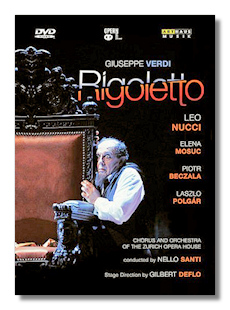
The Internet's Premier Classical Music Source
Related Links
- Verdi Reviews
- Latest Reviews
- More Reviews
-
By Composer
-
Collections
DVD & Blu-ray
Books
Concert Reviews
Articles/Interviews
Software
Audio
Search Amazon
Recommended Links
Site News
 DVD Review
DVD Review
Giuseppe Verdi

Rigoletto
- Leo Nucci (Rigoletto)
- Elena Mošuc (Gilda)
- Piotr Beczala (The Duke of Mantua)
- Lászlo Polgár (Sparafucile)
- Katharina Peetz (Maddalena)
- Kismara Pessatti (Giovanna)
- Rolf Haunstein (Monterone)
Zürich Opera House Chorus
Orchestra of the Zürich Opera House/Nello Santi
Arthaus Musik DVD 101285 128:00 Dolby Digital DTS LPCM Stereo Widescreen Anamorphic
On the whole, this is an admirable Rigoletto. Leo Nucci recently made news for having sung the title role 400 times, and there's no question that he knows Verdi's jester inside out – this is a detailed, nuanced portrayal that both excites and makes one weep. At the same time, there's no use in pretending that Nucci's voice is what it used to be. The velvet has worn away, and one wouldn't have to look hard to find a singer who makes a more beautiful sound, and who has to rely less on canniness than Nucci does. Predictably, "Pari siamo" goes better than "Cortigiani" (particularly the second half of it) because in the former aria, Nucci can fall back on his dramatic skill, whereas in the latter aria, if you can't produce a warm, smooth, and secure sound, something is lost.
His daughter is performed by the youngish Romanian soprano Elena Mošuc, who frequently sings with the Zürich Opera. Here's a singer who excels as the Queen of the Night, and who consequently nails all of the coloratura in "Caro nome," but who can make Gilda into something more than a pretty twitterer. Her performance in this role reminded me of that of another Romanian soprano – that is, Ileana Cotrubas, and that is meant as high praise indeed. Mošuc is credibly girlish and tolerably sweet, and her singing is thoroughly likeable, even if she doesn't make an unforgettable impression in this role.
Much the same could be said about Piotr Beczala, a Polish tenor who also makes frequent appearances in Zürich. He's a handsome fellow with a gleaming tenor voice, frequently put to the service of Mozart. His Duke is impetuous – more thoughtless than a true libertine, and it is fun to see him seducing Maddalena (and enjoying it!) in the last act. He doesn't always sound at ease in this role, though – sometimes it's as if he is having difficulty getting all the words out, and so his Duke is a little unstylish compared to, for example, his Ottavio, which is a model of poise. "Possente amor," though, is wonderful, and this probably is the hardest thing in the score. Beczala is 90% there in this role, and it is a little frustrating that he doesn't have the last 10% yet.
The secondary roles are acceptably cast without being distinctive. The Monterone tries to be imposing but is just blustery, and the Maddalena, while visually sexy, doesn't really have the voice to back it up. Polgár's light-voiced Sparafucile is refined, both vocally and dramatically, and Pessatti's Giovanna is better than most.
Nello Santi, who made his debut in 1951 with this opera, also knows what he is doing, and he does it without a trace of routine. This is a smart, exciting reading that has the power to surprise without sinking into self-indulgence. With the exception of "Possente amor"(one verse only), the standard cuts are taken.
Director Gilbert Deflo has updated the action to Verdi's time, which does the opera no real harm. The sets are a little stark, though. The Duke seems to live not in a palace but in warehouse, and in the last act, Sparafucile's inn has been reduced to a fire escape and some picnic tables. On the other hand, Rigoletto's living room is a Victorian dream of blue patterned wallpaper. Blue and red are the dominant colors, and there is not much else.
The sound and videography are quite good, as are the English subtitles, except for a few solecisms.
Copyright © 2008, Raymond Tuttle




















